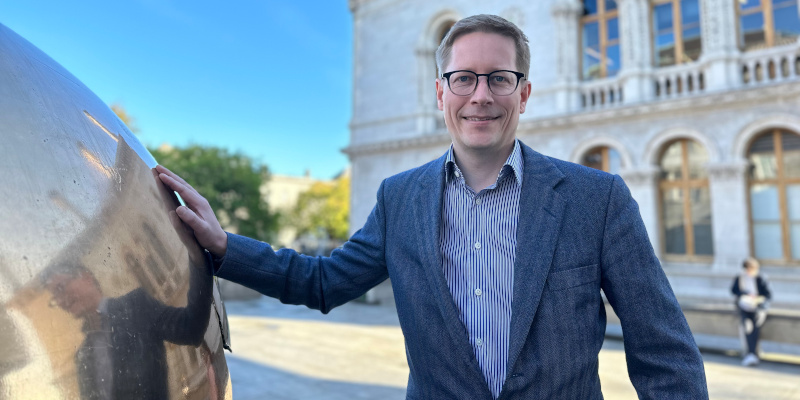In This Section
Machines – not humans – to drive future wireless demands, expert predicts

- Historic first for Irish universities sees Joint Professor of Wireless Communications appointed to UCC, Trinity, and Tyndall
- Professor Holger Claussen shares this assessment of the future of wireless networks
- Role created for Tyndall’s new Dublin research laboratory at Trinity
The future of wireless networks will be increasingly driven by machine demand, not human demand, according to leading wireless communication expert newly appointed to University College Cork, Trinity College Dublin, and Tyndall National Institute.
The joint appointment is a historic first for Irish Universities.
Professor Holger Claussen shares this assessment of the future of wireless networks as he takes up his new role as Joint Professor of Wireless Communications at University College Cork (UCC), and Trinity College Dublin (TCD). The role was created for Tyndall National Institute’s (Tyndall) new Dublin research laboratory at CONNECT, the SFI Research Centre for Future Networks, based at TCD.
Speaking about his research, Professor Claussen explains that future networks will connect the human, physical, and digital worlds, which will provide instant access to limitless information and near-infinite computing resources, to both humans and machines.
Real-time applications such as AR/VR and holographic video will provide new capabilities, and reliable low latency communications will be even more important than capacity.
In addition, new functionality such as high-resolution sensing and localization is becoming crucial for industrial and robotic applications.
Addressing how to respond to this demand to further improve on 5G networks, Professor Claussen said:
“Specialisation will be key, but designing and standardising specialised solutions can be slow and expensive. The solution is to create a hyper-flexible AI defined network, which can automatically adapt to meet even the most extreme requirements.”
Professor Claussen’s Joint Professorship is the very first of its kind between two Irish Universities, and establishes a multi-institutional partnership in the field of wireless communications between UCC, TCD, and Tyndall.
Speaking about the new appointment, Professor William Scanlon, CEO, Tyndall said, “Professor Claussen’s Joint Professorship is an exciting development in the delivery of Tyndall’s ambitious growth plans where our goal is to significantly scale our research and its impact.
“Our expansion into Dublin is testament to Professor Claussen’s reputation as a renowned thought leader in wireless communications and an internationally recognised scientific authority in the area of small cell networks. His extensive research and leadership experience from one of the world’s most influential research organizations, Nokia Bell Labs, positions Ireland to the forefront of this critical technology.
“We look forward to supporting him as he establishes a world leading research team.”
Professor John O’Halloran, President, UCC said “The Joint Professorship, based at Tyndall, will create a new focus and approach, underpinning a world leading research team solving fundamental challenges in wireless and artificial intelligence. The outcomes will have broad societal impact, transforming how we work, live, learn, and how we interact with each other, with machines, and our environment.”
Linda Doyle, Provost and President, TCD, said,
“I welcome this Joint Professorship as a practical way of establishing closer collaboration between researchers in Trinity, UCC and Tyndall.
“The focus of Professor Claussen’s work is very exciting – it has the potential to unlock the full capabilities of augmented reality, virtual reality and holographic video by using artificial intelligence to manage the demands on wireless networks. This will have a wide range of potential applications in areas such as medicine, education and entertainment.
“I am glad that this partnership will also see Professor Claussen’s research group working closely with CONNECT’s world leading researchers in Trinity, with both teams availing of each other’s facilities.”
